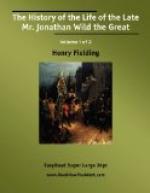much art, as many excellent qualities, required to
make a pimping porter at a common bawdy-house as would
enable a man to prostitute his own or his friend’s
wife or child? Doth it not ask as good a memory,
as nimble an invention, as steady a countenance, to
forswear yourself in Westminster-hall as would furnish
out a complete tool of state, or perhaps a statesman
himself? It is needless to particularize every
instance; in all we shall find that there is a nearer
connexion between high and low life than is generally
imagined, and that a highwayman is entitled to more
favour with the great than he usually meets with.
If, therefore, as I think I have proved, the same
parts which qualify a man for eminence in a low sphere,
qualify him likewise for eminence in a higher, sure
it can be no doubt in which he would chuse to exert
them. Ambition, without which no one can be a
great man, will immediately instruct him, in your
own phrase, to prefer a hill in Paradise to a dunghill;
nay, even fear, a passion the most repugnant to greatness,
will shew him how much more safely he may indulge
himself in the free and full exertion of his mighty
abilities in the higher than in the lower rank; since
experience teaches him that there is a crowd oftener
in one year at Tyburn than on Tower-hill in a century.”
Mr. Wild with much solemnity rejoined, “That
the same capacity which qualifies a mill-ken,[Footnote:
A housebreaker.] a bridle-cull,[Footnote: A highwayman.]
or a buttock-and-file, [Footnote: A shoplifter.
Terms used in the Cant Dictionary.] to arrive at any
degree of eminence in his profession, would likewise
raise a man in what the world esteem a more honourable
calling, I do not deny; nay, in many of your instances
it is evident that more ingenuity, more art, are necessary
to the lower than the higher proficients. If,
therefore, you had only contended that every prig
might be a statesman if he pleased, I had readily
agreed to it; but when you conclude that it is his
interest to be so, that ambition would bid him take
that alternative, in a word, that a statesman is greater
or happier than a prig, I must deny my assent.
But, in comparing these two together, we must carefully
avoid being misled by the vulgar erroneous estimation
of things, for mankind err in disquisitions of this
nature as physicians do who in considering the operations
of a disease have not a due regard to the age and complexion
of the patient. The same degree of heat which
is common in this constitution may be a fever in that;
in the same manner that which may be riches or honour
to me may be poverty or disgrace to another:
for all these things are to be estimated by relation
to the person who possesses them. A booty of
L10 looks as great in the eye of a bridle-cull, and
gives as much real happiness to his fancy, as that
of as many thousands to the statesman; and doth not
the former lay out his acquisitions in whores and fiddles
with much greater joy and mirth than the latter in
palaces and pictures? What are the flattery,




